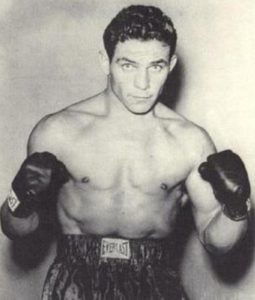“The Survivor” of Auschwitz
 Herschel “Hertzko” Haft (1925-2007) was born in Poland and orphaned at the young age of 3. During the Nazi occupation of Poland, he ran a smuggling ring with his brother in order to survive. In 1942, he was sent to Auschwitz. An SS officer noticed his muscular physique and decided to train him to be a boxer. Haft was forced to fight other inmates (at the neighbouring Jaworzno camp), often to the death, for the entertainment of the SS officers. He won and survived through a total of 76 fights. With the Soviet Army closing in, the Nazis forced all the inmates on a death march, which Haft also managed to survive. During his escape, he killed a Nazi soldier and put on his uniform. He eventually made it to an American DP camp, and finally settled in New Jersey in 1948. Haft became a light heavyweight boxer and had 21 fights, of which he won 13. His last fight was against a young and up-and-coming Rocky Marciano, who later became heavyweight champion and one of the most famous boxers in history. The Italian mafia threatened Haft and forced him to lose the fight to Marciano. Haft decided to end his boxing career. He got married and opened a small grocery store in Brooklyn, where he lived the rest of his life quietly. In 2007, he was inducted into the National Jewish Sports Hall of Fame. A film about his incredible story, The Survivor (starring Ben Foster, Danny DeVito, and John Leguizamo) was released yesterday in Israeli theatres and on HBO in honour of Yom HaShoah.
Herschel “Hertzko” Haft (1925-2007) was born in Poland and orphaned at the young age of 3. During the Nazi occupation of Poland, he ran a smuggling ring with his brother in order to survive. In 1942, he was sent to Auschwitz. An SS officer noticed his muscular physique and decided to train him to be a boxer. Haft was forced to fight other inmates (at the neighbouring Jaworzno camp), often to the death, for the entertainment of the SS officers. He won and survived through a total of 76 fights. With the Soviet Army closing in, the Nazis forced all the inmates on a death march, which Haft also managed to survive. During his escape, he killed a Nazi soldier and put on his uniform. He eventually made it to an American DP camp, and finally settled in New Jersey in 1948. Haft became a light heavyweight boxer and had 21 fights, of which he won 13. His last fight was against a young and up-and-coming Rocky Marciano, who later became heavyweight champion and one of the most famous boxers in history. The Italian mafia threatened Haft and forced him to lose the fight to Marciano. Haft decided to end his boxing career. He got married and opened a small grocery store in Brooklyn, where he lived the rest of his life quietly. In 2007, he was inducted into the National Jewish Sports Hall of Fame. A film about his incredible story, The Survivor (starring Ben Foster, Danny DeVito, and John Leguizamo) was released yesterday in Israeli theatres and on HBO in honour of Yom HaShoah.
Words of the Week
We, the God-fearing, criticize and prosecute the secular state, while the secular Jews take action and create facts on the ground. I also used to think that this was the proper approach, and I would curse the heretics with great fervor, anticipating that my curses would be fulfilled. But that did not happen. On the contrary, I saw that they were becoming stronger and stronger. So, I said to myself, that perhaps it is better if we switch roles. I will build the land of Israel in holiness and the seculars can curse me!
– Rabbi Yekutiel Yehudah Halberstam, the Sanz-Klausenberger Rebbe, renowned Hasidic leader and Holocaust survivor, on why he made aliyah.


